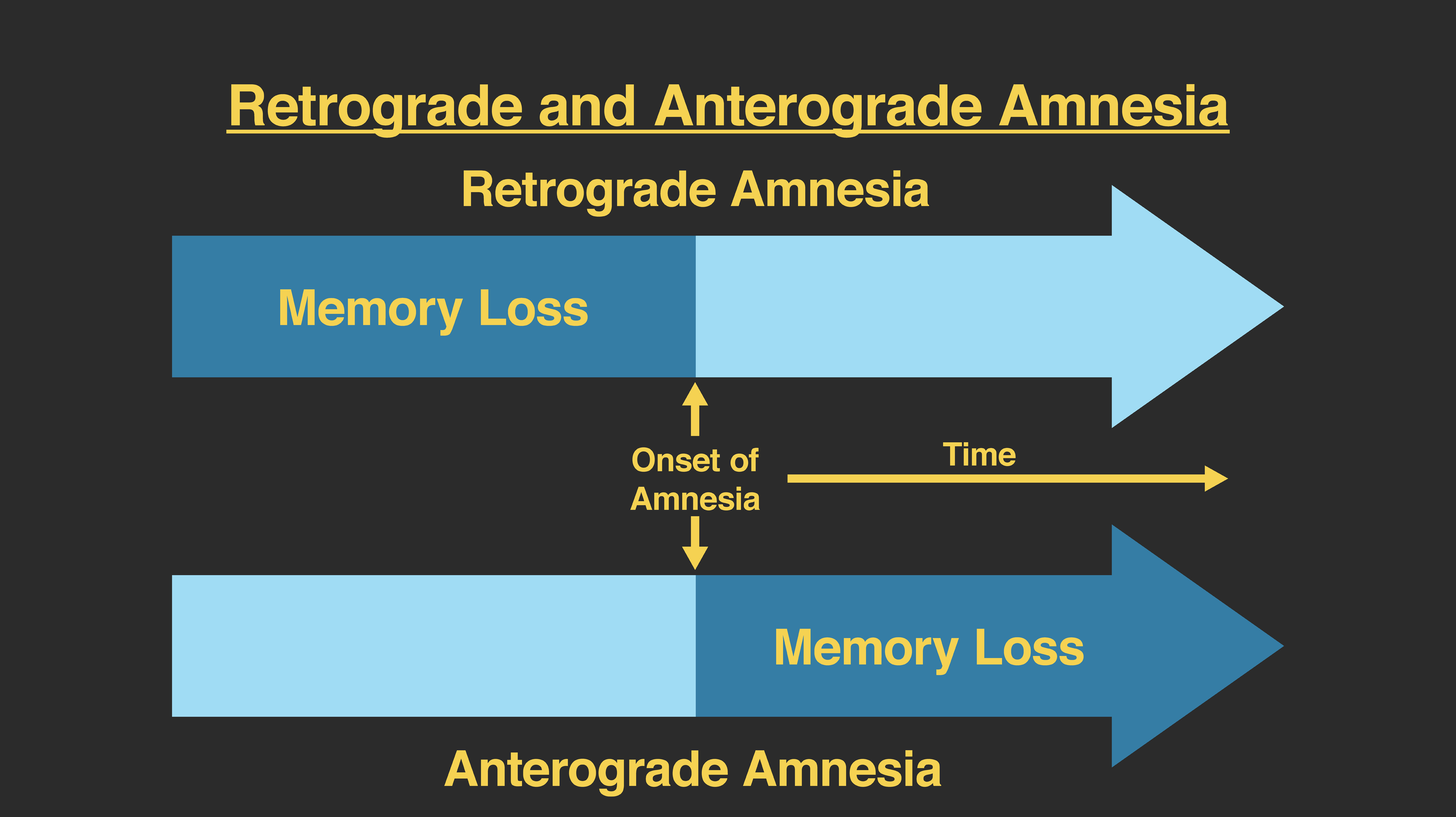Explain How Anterograde Amnesia Differs From Retrograde Amnesia
The severity of anterograde amnesia is usually correlated with the severity of retrograde. Summarize the theories that address the reasons we forget.

Anterograde Amnesia Retrograde Amnesia Impairment Of Memory For Events Before The Injury Anterograde Amnesia Impairment Of Memory For Events After An Ppt Download
With anterograde amnesia a person cannot form new memories.

. Memory problems that extend back in time before the injury and prevent retrieval of information previously stored in long-term memory are known as retrograde amnesia. Anterograde amnesia differs from retrograde amnesia because antrerograde amnesia is the inability to form new memories. Conversely memory problems that extend forward in time from the point of injury and prevent the formation of new memories are called anterograde amnesia.
Figure 3 - A Axonal transport can occur in two directions. Explain how anterograde amnesia differs from retrograde amnesia and use personal examples to support your explanation. Retrograde amnesia is loss of memory before the trauma and anterograde amnesia is loss of memory after the trauma I used the study technique of rehearsal to say the name and definition of each type of amnesia.
What is the Difference Between Retrograde and Anterograde Amnesia. Retrograde amnesia is the inability to recall past memories while anterograde amnesia is the inability to create new memories. Psychology questions and answers.
Rose. RA is usually the result of damage in different parts of the brain accountable for controlling emotions and memories. Anterograde amnesia on the other hand involves the lack of ability to form latest memories of any variety after the disorder developed.
Take for example someone who was in a car accident. Retrograde amnesia RA refers to the loss of information that was acquired before the onset of amnesia. In both types of amnesia memory loss takes place due to brain damage.
Retrograde amnesia on the other hand refers to experiencing issues with accessing memories before the onset of amnesia. That is while in the antegrade previous memories are preserved in the retrograde they are not. Which brain disorder typically displays anterograde amnesia.
Retrograde amnesia is the inability to recall past memories while anterograde amnesia is the inability to create new memories. Anterograde and retrograde amnesia Another distinction between two major types of amnesia is based on whether the patient is forgetting past facts or forgetting things as they happen. Anterograde amnesia on the other hand exists when you have the inability to form new memories.
They are not mutually exclusive and they can occur simultaneously. In retrograde amnesia patients forget events that occurred in their lives before they experienced the trauma and the oldest facts are the ones least likely to. On the other hand retrograde amnesia is an inability to retrieve information from ones past.
Discuss the difference between anterograde and retrograde amnesia and give a specific example of each. Retrograde amnesia occurs when a person is unable to access memories of events that. When a person is unable to store and retain new information but is able to recall data and events.
Therefore anterograde amnesia refers to having difficulties forming memories after amnesia sets in. Retrograde amnesia is the involvement of the memory loss of events people places etc. One form of amnesia called retrograde amnesia.
The results of these experiments suggest that with anterograde memory impairment induced by traumatic brain injury the primary deficit lies in task acquisition not the retention of information within long-term memory. Retrograde memory impairment following injury appears to be mediated primarily by deficits in memory retrieval. Explain the difference between retrograde amnesia and anterograde amnesia.
When someone who suffers a TBI recovers from a period of loss of consciousness they often have retrograde amnesia that is they cannot remember the accident and the few minutes prior to the accident. There are two defined forms of amnesia. Retrograde amnesia is a loss of memories that have been already formed while anterograde amnesia is an inability to form new memories.
The difference between the two is that in retrograde the person cannot remember what happened before the trigger for the disease. What is the difference between anterograde and retrograde Axoplasmic transport What is the molecular motor protein associated with each. The major difference between retrograde amnesia and anterograde amnesia is the following.
Anterograde transport is from the cell body toward the axon tip and retrograde transport is from the axon tip back toward the cell body. In retrograde amnesia the individual is unable to recall past memories whereas in anterograde amnesia View the full answer. When it comes to retrograde amnesia you are unable to know what happened before.
The theories that address the reasons we forget. Why using material from Module 32 can people with anterograde amnesia still learn new nonverbal tasks. Anterograde amnesia AA refers to an impaired capacity for new learning.
Read the full article. They can only remember the past. It has long been recognized that AA and RA tend to occur together in the same patients Barbizet 1970.
That were encountered and experienced before the amnesia took its toll on the patient. Retrograde amnesia can be diagnosed through an MRI scan or CT scan blood tests a neurological examination a cognitive test or an electroencephalogram which checks for seizure activity. Retrograde amnesia refers to the loss of information acquired before amnesia while anterograde amnesia AA is an impaired capacity for new learning.
What are the Similarities Between Anterograde and Retrograde Amnesia. With retrograde amnesia a person cannot remember their own past.

Types Of Amnesia Definitions Memoryhealthcheck

Difference Between Anterograde And Retrograde Amnesia Compare The Difference Between Similar Terms

No comments for "Explain How Anterograde Amnesia Differs From Retrograde Amnesia"
Post a Comment